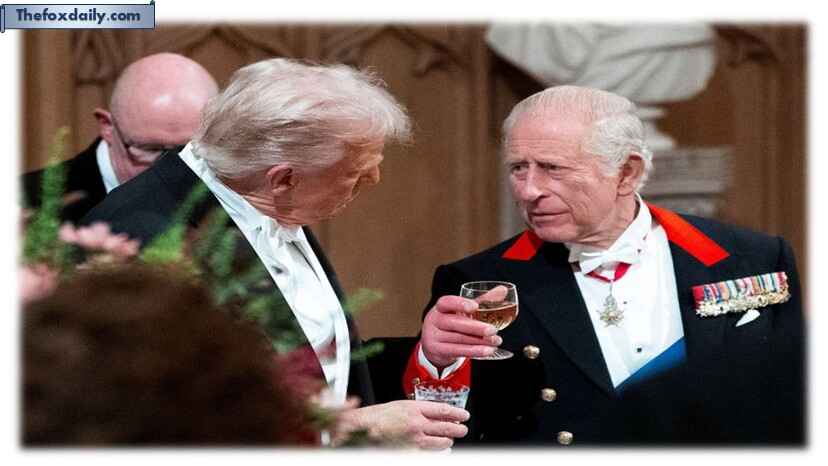
Even though it was brief, King Charles III’s reference to Ukraine on Wednesday night stood out in a speech that studiously avoided any hint of geopolitics.
At a royal supper held beneath the vaulted ceilings of St. George’s Hall at Windsor Castle, Charles addressed President Donald Trump, “We fought together to defeat the forces of tyranny in two World Wars.” “Today, as tyranny once again threatens Europe, we and our allies stand together in support of Ukraine, to deter aggression and secure peace.”
It served as a noteworthy, if tactful, reminder to his guest that, despite Trump’s apparent hesitancy to impose fresh sanctions on Moscow and his continued anger at Ukraine’s leader for rejecting a deal, American involvement in the Western effort to prevent Russia’s war is still vital and urgent.
The topic of Ukraine stands out among the pomp and circumstance of this week’s state visit as one that will put Britain’s renowned soft power to the test in persuading Trump to put more pressure on Russian President Vladimir Putin.
Some European officials hope that Trump will get a new understanding of the US’ longstanding responsibility in European security as well as a new outlook on his colleagues’ demands for fresh measures against Russia as a result of the charm effort.
First lady Melania Trump‘s sunflower-colored Carolina Herrera gown from Wednesday’s luncheon, which resembled the Ukrainian flag when worn with Queen Camilla’s royal blue outfit, was interpreted by some of those officials as tacit support for the nation.
When Trump meets with Prime Minister Keir Starmer on Thursday, the subject is almost guaranteed to come up. Starmer has attempted, but failed, to persuade Trump to take a more aggressive approach against Moscow.
The two men will see artifacts from the Winston Churchill archive at Chequers, the prime minister’s rural Buckinghamshire house, which serves as another reminder of the United States’ former involvement in Europe during the war.
But it’s unclear if the message will be understood. At his own toast on Wednesday night, Trump made no reference to the ongoing violence. And unless Trump reveals the specifics, it’s unlikely that anyone will ever know if he spoke with the king about it over dinner.
It was unlikely a coincidence that Charles brought up the war. His remarks would have been written with input from Britain’s government. Additionally, the king has demonstrated a willingness to support the Ukrainian cause in the past, hosting President Volodymyr Zelensky at his private residence in Sandringham in March, three days after the Ukrainian leader’s explosive Oval Office blow-up with Trump. Sources claim that the king is informed about ceasefire negotiations.
Trump once more expressed his annoyance with Zelensky as he was leaving for the UK on Tuesday, saying that he was preventing a deal that would end the war.
“He needs to move quickly and strike a deal. He will need to come to an agreement. Zelensky is going to have to make a deal,” Trump said as he was leaving the White House.
A series of high-profile summits last month, including one with Putin in Alaska and another with Zelensky and other European leaders at the White House, seemed to have little effect on the president’s efforts to mediate an end to the violence in Ukraine.
Russia has persisted in demanding that Ukraine never join NATO and occupying the whole Donbas territory as part of its maximalist demands to settle the conflict. Its drones most recently entered NATO member Poland’s airspace, escalating the situation and inciting fury and promises from European countries (but not the US) to increase their military presence in the area.
Nevertheless, Trump declared on Tuesday that Zelensky had to accept a deal to stop the war. Furthermore, he stated that European countries, not the US, needed to exert more pressure on Putin.
“Europe must cease purchasing Russian oil.” All right? They talk, you know. However, they must cease purchasing oil from Russia,” Trump continued, reiterating his demand for additional European initiatives to put an end to the conflict.
Trump has imposed a new duty on India for its purchases of Russian oil, but he has refrained from pursuing measures against China, the second largest buyer, with which he is attempting to negotiate a trade agreement.
Trump is set to meet with Chinese leader Xi Jinping on Friday after speaking with Indian Prime Minister Narendra Modi on Tuesday. How much he wanted to bring up the conflict in Ukraine with either man was unclear.
Meanwhile, European leaders have found it difficult to comply with Trump’s demands. They seemed unlikely to consent to increased levies on two significant trading partners, China and India. In contrast to Trump, European officials have stated that they do not intend to employ tariffs as a form of coercion.
Additionally, some states, like as Hungary, which is run by top Trump friend Viktor Orban, continue to rely on Russian natural gas and oil despite European nations’ attempts to expedite measures to stop importing these products.
European officials have expressed little hope that Trump will take fresh action as a result, with many expressing the opinion that the demands he started outlining earlier this month were really an effort to delay new action.
For breaking news and live news updates, like us on Facebook or follow us on Twitter and Instagram. Read more on Latest World on thefoxdaily.com.






COMMENTS 0